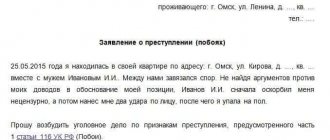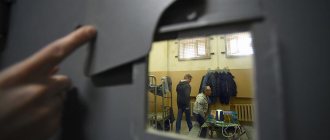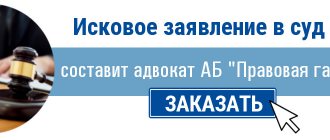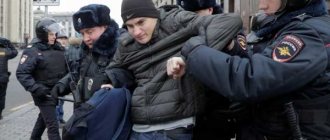Every year in Russia, about a thousand sentences are passed under the article on abuse of power (Part 3 of Article 286 of the Criminal Code of the Russian Federation), says the report “Violence of Security Forces. Crimes without punishment" by the human rights organization "Zone of Law". However, the number of decisions on such cases is gradually decreasing: in 2010 there were 1,817, and in 2017 - 799.
Those accused of abuse of power sometimes escape punishment: over the past 10 years, 4% of the defendants were acquitted by the court or the cases against them were dropped on exonerating grounds. This is partly due to the fact that security forces accused of torture have special knowledge, including how to interfere with an investigation.
“Things like this” together with the author of the report “Violence by Security Forces. Crimes without punishment,” lawyer Maxim Nikonov, prepared instructions for those who are subjected to violence by security forces. How to act at each stage - during detention and torture, after release, during legal support of the case?
Photo: pxhere.com
What to do during arrest?
Do not resist during arrest
If you are detained, there is no need to use violence against law enforcement officers. Firstly, it will be regarded as resistance and will become a reason for retaliatory violence. Secondly, the police will be able to explain your injuries by saying that you resisted during arrest, tried to escape or attack the officers. Thirdly, you may be charged with Article 318 of the Criminal Code of the Russian Federation (use of violence against a government official).
Contact your loved ones
Try to contact relatives or friends as quickly as possible. Report that you have been detained, also tell where you are being taken, and ask to find a lawyer who could quickly provide legal assistance. If the detention is formalized (with the drawing up of a protocol), indicate in it that you want to call a relative and use the help of a lawyer. The protocol must be drawn up within three hours after you are taken to the inquiry agency or to the investigator.
On the barricades
“The riot police do not see people in others, for them the crowd is work. They don't choose which side to take. Like security guards in a store: they sit, make sure that the goods are not stolen, and if they are stolen, they react. If riot police are given the task of “displacing people,” it doesn’t matter how it happens. You will crush grandmothers, women and children, but you will carry out the order,” says 24-year-old Mark Mayorov ( Name changed at the request of the hero - Utopia.
).
In 2021, after receiving a bachelor’s degree in law, he entered military service in the Dzerzhinsky Separate Division of National Guard operational troops, where he and his colleagues were specially trained to disperse protesters.
Now it’s hard to imagine Mark in military uniform: his hair is neatly styled with gel, chains dangle around his neck, and there is a healed scar from an earring in his ear. Only the constitution of the body reveals that five years ago the guy spent a whole year wearing ankle boots instead of boots and a sheepskin coat instead of a robe. The guy doesn’t care about politics, then or now.
In the army, Mark was taught to shoot and react to a protester who throws a Molotov cocktail. And not just a protester, but definitely a “paid, corrupt, socially dangerous provocateur-protester”—that’s how they “explained” it on the parade ground.
According to psychologist Naira Parsadanyan, the psychological technique when, during training, security forces are molded into a “comfortable” image instead of a real opponent, is called dehumanization - that is, depriving the subject of traits with which one can sympathize. “Those who join law enforcement agencies are most likely initially socialized and brought up in an environment in which they were taught the position of “friend or foe.” The service only strengthens their opinion that they are doing everything right, and the protesters are breaking the law.”
Photo: Elena Lukyanova / Novaya Gazeta
Mayorov recalls the words of the commanders that because of the provocateurs, the situation in the country is very precarious. The riots, he said, were exaggerated: every morning the soldiers were told that there was almost a revolution in Moscow - they were preparing to go out into the world.
For conscripts, the rules were simple: do not answer questions, do not hit people, do not move without orders. In the summer of 2021, Mark was cordoned off on Red Square during the “He’s not Dimon to you” campaign. I sat motionless in the car for half a day, fell asleep there because of the early rise and woke up from the commander’s shouts: “We need to block Tverskaya!”
“We ran in full uniform from the Four Seasons Hotel to McDonald’s on Tverskaya,” recalls Mayorov. “The whole way the people around were shouting about what *******s we are, freaks, traitors, and so on. But there was no time for shame: you only think about when it will be possible to eat and sleep.” For the rest of the day, Mark stood in a cordon in a line across the street.
In an interview with Meduza, a former police officer said that those with the lowest rank or those who had committed the most offenses were placed in a cordon - to stand as a human fence and scare people by hitting their shields with sticks.
If a person was not initially inclined towards cruelty and the use of force, then when he joins the security forces, he is faced with a choice, explains Parsadanyan. “Either this is so alien to his concept of the world that he is not ready to simply participate in it all and will leave the system, or he will rationalize his participation in violent actions and make excuses: he needs to feed his family, everyone around him is doing the same, I’m doing a good job “says the psychologist.
According to her, in psychology, the terms “abuser” and “author of violence” are distinguished depending on whether a person receives pleasure from causing violence or suffers from internal conflict. The former, the psychologist says, is almost impossible to help, but the latter can be worked with. It’s the same with the security forces.
The choice in the direction of humanity, the psychologist gives an example, was made by the security forces in Minsk on August 14 during a demonstration on Independence Square. Then riot policemen at the Government House of Belarus lowered their shields in front of the demonstrators as a sign of solidarity. The protesters greeted the peaceful gesture with applause, flowers and hugs.
However, Russian legislation actually prohibits law enforcement officers from showing such “disrespect” towards government agencies. If statements or actions raise doubts about the loyalty of an internal affairs officer, he may be fired. “Unfortunately, any system does not like individuality. The system will either squeeze out this individuality or destroy it,” says Parsadanyan.
What to do if law enforcement officers use force or torture?
Remember employees who use force
Pay attention to surnames, first names, titles, clothing features, uniforms (epaulets, chevrons, badges), gender, age, height, physique, special features (beard, mustache, moles, tattoos, scars), nationality, speech patterns (accent, stuttering, sayings). All this information will make it easier to find and identify employees in the future.
Try to remember the place where the torture took place
Remember what the room looks like: in which building, on which floor and in which wing it is located. If during the beating something in the office was damaged, pieces of furniture were broken or glass was broken, or traces of blood remained - it is important to remember these circumstances. For example, even small drops of blood that fall on the walls or floor can be used for DNA analysis, which will confirm that it belongs to the victim. Also see if the department has internal security cameras and where they are located, try to get into their view.
Remember the witnesses
Try to remember whether there were witnesses to your arrest and detention at the police department. These could be acquaintances, random passers-by or other visitors. It is these people who will then be able to confirm that before you got to the police department, you did not have any bodily injuries or health complaints.
Request a medical examination
Beaten by the police: what to do
Home Press center Beaten by the police: what to do
Violence in law enforcement is not a thing of history. Most often it is used to obtain confessions. Sometimes - “for the sake of caution” so that the detainee “does not lose his license.” Sometimes - just to demonstrate strength and vent anger. According to expert estimates, violence is used most often by the police. Fewer in the FSB and the Investigative Committee. The recommendations below are universal and can be used to report torture against an employee of any law enforcement agency. The exception here is the employees of the Federal Penitentiary Service, since the collection of information and verification of allegations of beatings in institutions of the penitentiary system are particularly specific.
How can I prove that I was beaten by the police?
1. The most important thing is to record the injuries that the police caused to you.
Medical documentation of bodily injuries is the basis without which it is almost impossible to achieve good results in verifying a claim of torture. A common mistake is not recording or registering injuries late in a medical facility. Remember: verbal descriptions or photographs of injuries are not enough; official medical documents must be obtained.
There are several ways you can do this.
Firstly, if possible, call yourself or ask to call an ambulance to the place of detention or to the police department. For example, this request can be indicated in the protocols of investigative and operational actions that are carried out with you. You can complain about poor health to the employees themselves. Sometimes, when they fear the consequences of not providing medical care, it works. If there are strangers nearby, ask them to call an ambulance.
Secondly, if after the beating you were released from the police department, immediately, without any delay, undergo a medical examination. In Vladimir, this can be done, for example, at the Bureau of Forensic Medicine at the address: st. Bolshaya Nizhegorodskaya, 65-a.
Important! Medical examinations are carried out around the clock; there is no need to wait for the start of the working day or when things get “better”. Remember: to undergo a medical examination, neither an investigator’s order nor any other “permit” document is required. It is enough to draw up an agreement and pay for the examination (in Vladimir - about 700 rubles).
Thirdly, if you were not released from the police, but were sent to a temporary detention facility, special detention center, pre-trial detention center, etc. – ask for a medical examination upon arrival there.
Important! Whatever method you use, ask doctors to record bodily injuries in as much detail as possible (their nature, size, color, location on the body), as well as the circumstances of their receipt - who, where, when, how and with what they were inflicted.
2. Remember those who may witness the beating, if possible, write down their contacts.
Firstly, these are the police officers themselves who used force.
Important! Remember as much information as possible by which they can be identified: last names, first names, ranks, color and features of clothing, uniforms (epaulets, chevrons, badges), gender, age, height, physique, special features (beard, mustache, moles, tattoos) , scars), nationality, speech characteristics (accent, stuttering, sayings), etc.
Secondly, these are people who could see you at the police department - other employees, detainees or people waiting to be seen on other matters (near the duty station, offices of other employees, etc.).
Thirdly, these are people who saw you during your arrest, before and after your detention at the police department. These could be relatives, acquaintances, neighbors, passers-by, doctors who examined you...
It is best that these are persons who are in no way related to you by family or friendship. Formally, there is no prohibition on using the testimony of such witnesses, but if you only have them, those checking your application may write that they do not trust such testimony, since it was given by “interested parties.”
Important! If these are persons previously unknown to you (other detainees, cellmates, random witnesses), if possible, exchange contacts with them (last and first names, phone number, place of residence).
The main thing is that they can confirm that before you got to the police department, you did not have any bodily injuries or health complaints, and then they appeared.
This is important because it makes good use of the legal position of the European Court of Human Rights: “Where the events in dispute are wholly or for the most part within the exclusive knowledge of the authorities, as in the case of persons detained under the control of the authorities, strong presumptions of fact arise as to injuries and deaths occurring while in custody. Moreover, it should be considered that the burden of proof lies with the authorities, who must provide a satisfactory and convincing explanation for the “applicant’s injuries” (Kornev v. Russia judgment of 28 September 2006, application no. 26089/02, §35, “Filatov v. Russia” of November 8, 2011, complaint No. 22485/05, §58, etc.).
In other words, if the applicant has filed a complaint about torture, then the burden of proving the absence of torture lies on the law enforcement officers against whom such a statement was made.
The fact that there was no unlawful influence on the applicant must be established beyond a reasonable doubt. Moreover, “any deficiency in the investigation that makes it impossible to establish the origin of the injuries or the identity of the perpetrators may lead to a violation of this standard” (Shishkin v. Russia, July 7, 2011, complaint No. 18280/04).
3. Try to remember the place where you were beaten.
If this happened on the street - where exactly everything happened and what is nearby (residential buildings, shops, kiosks, children's playground, etc.).
If this is an office in the police department - where was it located (address, floor, wing of the building, corner office or not, far from the elevator/stairs or not), what it looks like (shape and approximate area, how many windows, how they are located and what kind of tables, chairs, cabinets, sofas, furnishing features - flower pots, maps, sports equipment, etc.).
If during the beating something in the office was damaged, pieces of furniture were broken, glass was broken, there were traces of blood - try to remember these circumstances.
4. If possible, turn on the voice recorder on your phone.
There is no point in doing this demonstratively or turning on the video recording - this will not protect against possible aggression, and besides, they will simply take your phone away and you will not be able to use it. It is better to secretly enable audio recording in the background, positioning the phone so that it is not very noticeable, and at the same time it records sound normally. At the same time, you shouldn’t rely heavily on your phone - it can still be discovered, taken away, and the record erased. But you shouldn’t neglect the available technical capabilities.
If you are afraid that you may be detained, inform your relatives in advance, warn them about the necessary measures in such an emergency situation, and also enter into an agreement with a lawyer who could immediately go to the police department to provide you with legal assistance.
How and where to complain?
Verification of allegations of crimes committed by state representatives (including police officers and other law enforcement agencies) is carried out by investigators of the Investigative Committee of the Russian Federation. Therefore, the application is submitted to the territorial department of the Investigative Department of the Investigative Committee for the area where the beating took place. The law does not prohibit filing an application with any investigative department, but this leads to a loss of time in redirecting the application to the “correct” investigative department.
The application must indicate the last name, first name, patronymic, contact details of the applicant, as well as clearly and without “lyrical digressions” the circumstances of the incident (date, time, place, specific actions and signs of police officers, injuries received). You should immediately attach medical documents to the application, as well as indicate possible witnesses (if known, their full names and contacts). Then, during the inspection, you will be able to give more detailed and detailed explanations.
The pleading part of the application can be formulated as follows: “I ask you to check the facts specified in the application, give them a criminal legal assessment and determine whether the actions of the police officers contain a crime under Part 3 of Article 286 of the Criminal Code of the Russian Federation.”
It is better to submit a signed application with attachments in person, rather than by mail or through the online reception. You must be given a notification slip that your application has been accepted. This will allow you to track, among other things, the timing of the verification of the application.
What about the testimony that I gave under torture and the protocols that I signed?
According to the legal position of the ECtHR, “corroborative evidence – whether in the form of a confession or physical evidence – obtained as a result of violent acts or the use of cruelty or other forms of treatment that can be characterized as torture – should never be used to confirm the guilt of the victim, regardless of the possible value of such evidence. Any other conclusion will only help to indirectly legitimize the morally reprehensible behavior that the authors of Article 3 of the Convention tried to prohibit or, in other words, “to cover cruelty with the cloak of law” (Kharutyunyan v. Armenia, June 28, 2007, application no. 36549/ 03, §63).
Unfortunately, Russian courts and law enforcement officers, understanding the consequences of admitting the fact of torture (the “collapse” of the case, which rests on extracted confessions and “confessions,” the initiation of criminal cases against the police officers themselves), often ignore allegations of torture or verify them formally.
But there are no other ways to influence the situation other than a competent and persistent appeal in all instances, including the ECHR, which has developed a wealth of positive practice on complaints of torture.
If you need the help of a lawyer in criminal, family, or civil law, you can call 8-910-188-73-21 or write by email or telegram.
8-910-188-73-21 all methods of communication
What to do if you are released after torture?
Record bodily injuries
If you are released after arrest, immediately undergo a medical examination. This can be done around the clock without additional documents (directions, decisions). It is enough to draw up an agreement and pay for the examination. After a couple of days, it is useful to undergo a re-examination - then the injuries will be recorded “in dynamics”.
Without medical documentation of injuries, it is almost impossible to obtain a good review of a torture claim.
Why do people go to work in the Ministry of Internal Affairs
According to the decree of the Russian President, up to 894 thousand people can work in the internal affairs bodies, that is, one policeman for every 160 people. This is twice as much as in the United States: there is one police officer for every 358 civilians.
By 2014, 25 thousand people had joined the ranks of the Russian OMON, a special police unit. Since 2021, data on the number and structure of riot police has been hidden - now it is a state secret classified as “Secret”.
Daria Turchenkova, a former psychologist of the Ministry of Internal Affairs with 13 years of experience, told Utopia about the key factors that bring people to the police. The first is family tradition. According to her, the example of a parent serving in the authorities is still relevant, although sometimes elders, on the contrary, dissuade people from serving. The second is the opportunity to immediately find a job in your specialty after graduating from a specialized university.
At the beginning of his service, the average police officer receives 40 thousand rubles per month. With increasing rank (lieutenant, major, colonel, general) and increasing length of service and length of service, the salary also increases. In addition, employees receive bonuses for the complexity of the task performed. For example, for the dispersal of rallies on Bolotnaya Square in Moscow in December 2011, the salaries of riot police officers were increased by a third.
Police officers also receive additional benefits from the state: bonuses of up to 25% of the basic salary, payments for merit up to 40% of the basic salary, quarterly and one-time bonuses. They are provided with registration, housing and social benefits, free insurance, and medical care. Employees and their families are fully paid for housing rent and partially for vacations. They also have longer vacations than average - from 38 to 53 days a year, instead of the average 28.
“Many of us wanted to join the riot police,” says Mark. — For the guys, especially from the regions, the money was quite large, but the selection there is really difficult. They don’t take suckers there: you need to be two meters tall, beaten tightly and with the ideology that they need. The riot police are looking for people who can go and beat up other people for no reason, but you don’t find people like that so easily.”
Photo: Elena Lukyanova / Novaya Gazeta
Upon retirement after 13 years of service—one year of work is equivalent to one and a half years of service—police officers receive a high pension and the opportunity to purchase an apartment at the expense of the Ministry of Defense. This is also a strong motivator for the service: in 2018, the number of personnel of the Ministry of Internal Affairs sharply decreased, as employees began to resign en masse due to their length of service, which gives them the right to receive a pension. According to the Accounts Chamber of the Russian Federation, they feared that police reform would raise the retirement age for employees, and chose to quit rather than serve for several more years.
The choice of profession is also influenced by the personal qualities of security forces. “People join the riot police with a certain worldview, with a certain concept of themselves and a concept of others, in which others are objects,” says Parsadanyan. According to her, changing this pattern of behavior is sometimes almost impossible.
However, a dehumanizing worldview can come into conflict with the inner one, which is why a person will be destroyed: become bitter, callous and lose empathy, explains the psychologist.
What responsibility do law enforcement officers bear for beatings?
The Criminal Code contains several degrees of harm caused:
- Without special damage
The unequal actions of the law enforcement officer caused pain to the victim, but did not result in health problems or loss of ability to work. - Minor injuries
The victim experiences deterioration in health for a short period of time (no more than 21 days) or loss of ability to work (no more than 10%) - Moderately severe injuries
The victim received serious physical injuries, which, in general, do not have a negative effect on him. Due to injuries of this type, a person may lose the opportunity to lead a full life for a fairly long period of time and lose one-third of his working capacity. - Serious injuries
The consequences of such a beating entail the inability of a person to lead a normal life and work. They manifest themselves in serious injuries - any organ is damaged or lost, the stable functioning of the body is disrupted, vital functions of the body are lost, such as hearing, vision, speech.
The court will take into account the severity of the injuries inflicted when determining the punishment for the criminals, and will also take into account aggravating or mitigating circumstances.
The more severe the injuries inflicted by the guardians of law and order who crossed the threshold of the law, the harsher the sanctions applied to punish them.








